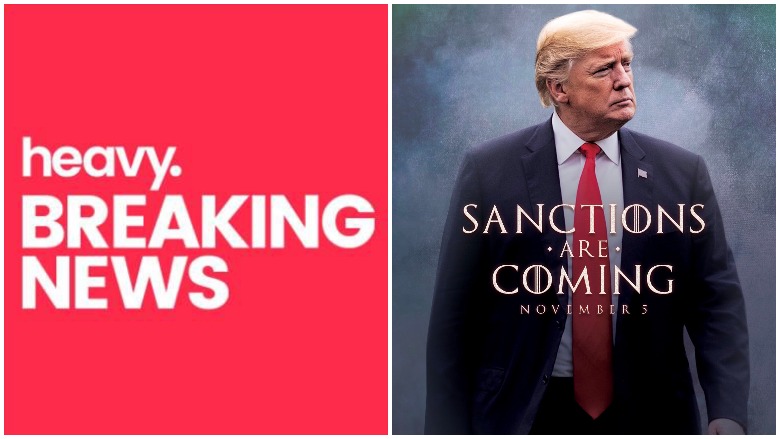
President Donald Trump used imagery invoking the popular “Game of Thrones” series for a tweet about upcoming sanctions. HBO was not pleased about it.
The tweet in question was sent on November 2 at 12:01 p.m. It is a picture of President Trump and features the words “Sanctions are coming.” The date listed underneath is November 5. The president did not include a caption along with the image.
The font is similar to what HBO uses for “Game of Thrones.” The phrase also appears to be a play on the series’ popular slogan, “Winter is coming.”
HBO Criticized the Tweet, Saying the Company Does Not Want its Trademark ‘Misappropriated For Political Purposes
HBO issued a short statement about the president’s post, which has since been widely shared. “We were not aware of this messaging and would prefer our trademark not be misappropriated for political purposes.” The network shared on Twitter, “How do you say trademark misuse in Dothraki?”
Members of the cast also responded on social media. Actress Sophie Turner, who plays Sansa Stark, responded to the president’s tweet with one word: “Ew.”
Maisie Williams, otherwise known as Arya Stark, responded, “Not today.”
Sanctions That Were Lifted as Part of the 2015 Iran Nuclear Deal Go Back Into Effect on November 5
The official White House twitter handle attempted to clarify what President Trump had been referring to. “President @realDonaldTrump is reimposing all sanctions lifted under the unacceptable Iran deal. The U.S. is reimposing the toughest sanctions ever on Iran, targeting many of the corrupt regime’s critical sectors.”
The Iran Deal, which was signed in 2015 under President Obama, lifted economic sanctions in exchange for Iran agreeing to limit its nuclear activity and allow international inspectors into the country. President Trump repeatedly slammed the deal during the 2016 election and vowed to withdraw the United States from the deal. He followed through on that pledge in May of 2018, despite calls from European allies urging him to remain in the deal.
Secretary of State Pompeo Said the Goal is to Discourage Iran From Developing Weapons & Critics Argue That Sanctions End Up Silencing the More Moderate Voices in Iran
The sanctions are scheduled to take effect on Monday, November 5, and target more than 700 Iranian individuals and businesses. Secretary of State Mike Pompeo explained the move to reporters on November 2. As reported by CNN, Pompeo said that the goal is to “hit at core areas of Iran’s economy. They’re necessary to spur changes we seek on the part of the regime.” In the call with reporters, Pompeo said the United States is working with allies to “cut off Iranian oil exports as much as possible.”
Pompeo explained that the added economic pressure is intended to discourage Iran from building its ballistic missile program. “Our ultimate aim is to compel Iran to permanently abandon its well-documented outlaw activities and behave as a normal country.”
However, as laid out in USA Today, critics have argued that sanctions against Iran have more of a negative impact on the everyday people, and not the regime itself. The newspaper highlighted Iran’s carpet-makers as an example. Businesses exported an estimated $428 million worth of carpets after the Iran Deal went into effect. About 30 percent of those sales were attributed to Americans.
The president of the National Iranian American Council, Jamal Abdi, is among the critics. He tweeted on November 2, “Impoverishing ordinary Iranians will not hurt the regime or achieve any of America’s security interests, but it will set back the Iranian people’s aspirations for years to come.”
Abdi penned a longer letter that was directed at Secretary Pompeo and Treasury Secretary Steve Mnuchin, that was published in full by the Iranian. He argued that sanctions may only serve to trigger the more extreme voices in the country, and silence moderates who prefer to have better relations with the west. The letter reads in part:
“The re-imposition of U.S. secondary economic sanctions against Iran as part of the administration’s “maximum pressure” campaign has raised deep concerns in the Iranian-American community and across the globe. These sanctions follow President Donald Trump’s unilateral decision to withdraw the U.S. from the July 2015 Iran nuclear deal (known as the “Joint Comprehensive Plan of Action,” or JCPOA), despite opposition from the international community, including America’s traditional allies in Europe. While the stated purpose of the sanctions is to elicit “behavior change” from the Iranian government, they are not attached to a diplomatic process aimed at finding compromise. Instead, the administration’s sanctions risk triggering a severe humanitarian crisis inside Iran and edging the U.S. towards another catastrophic Middle Eastern war…
Indeed, U.S. sanctions are empowering hardline forces who use their re-imposition to discredit their moderate rivals for negotiating with the West and as a pretext to harshly repress opposition voices under the guise of countering U.S.-led aggression. These anti-reform forces are far more threatened by Iran’s reintegration into the global economy than confrontation with the United States and are well positioned to take advantage of the economic desperation that sanctions are unleashing inside the country. Their influence will only grow as financial resources accumulate to only the unaccountable, well-connected few.”
READ NEXT: Skeleton of Missing Man Found Buried in Family’s Basement
